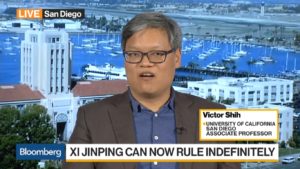
At China’s top leadership, it was always possible for different political agendas to exist next to each other. But since 2012 next to Xi Jinping – up for his unprecedented third term as CCP party secretary – very few variations in leadership style have been given room, says political analyst Victor Shih at the ABC. The retirement of premier Li Keqiang finalizes Xi’s powerful position, he adds. China’s next premier is likely to be a good friend of Xi, while women and ethnic minorities make little chance.
ABC:
As soon as he came into power within the party in 2012, Xi formed and headed a whole series of groups ranging from economic reforms, to Taiwanese affairs, to national security.
That has left Li little autonomy to set his own agenda, according to Associate Professor Victor Shih, from the University of California San Diego.
“The leading groups headed by Xi Jinping have been setting the agenda to a large extent,” Professor Shih said.
“The State Council became kind of an implementation organ instead of a policy-making organ.”…
So what kind of people are more likely to join the Politburo in October?
Professor Shih, who leads the CCP Elite Database, which tracks biographical information of thousands of elite party members, said connections with Xi Jinping would be key when it comes to eligibility for the Politburo.
This could be either through families — descendants of senior communist officials — or past working relationships with Xi.
Professor Shih said while there was still a place for officials with an ordinary background like Li to join the State Council next year, key positions would most likely be held by Xi’s connections.
He also said there would be fewer leadership positions for people coming from a social science background like Li, with more politicians from engineering backgrounds having been promoted during Xi’s reign.
The CCP Elite Database also shows that all current members of Politburo are of Han ethnicity, despite China being made up of 55 other minor ethnic groups.
And China is unlikely to have a female premier any time soon.
Less than 10 per cent of officials serving in the central government are women, according to China Elite Database.
“Even in a lot of Islamic countries, [some of which] discriminate against women, you typically will see a higher ratio. And in Western democracies, it’s like 40 to 60 per cent are women,” Professor Shih said.
Currently, the most powerful female official is Sun Chunlan, who is the second vice-premier overseeing China’s COVID strategy.
She is also the only woman in the current Politburo. There are no women in the Politburo Standing Committee.
Sun had been seen on the frontline of the pandemic in Shanghai and Wuhan, the two cities that went into lockdowns during China’s coronavirus peaks in 2020 and 2022.
“She should be the number one person in the party. But in that political system, she’s not qualified,” Professor Shih said.
Victor Shih is a speaker at the China Speakers Bureau. Do you need him at your (online) meeting or conference? Do get in touch or fill in our speakers’ request form.
Are you looking for more political experts at the China Speakers Bureau? Do check out this list.
No comments:
Post a Comment